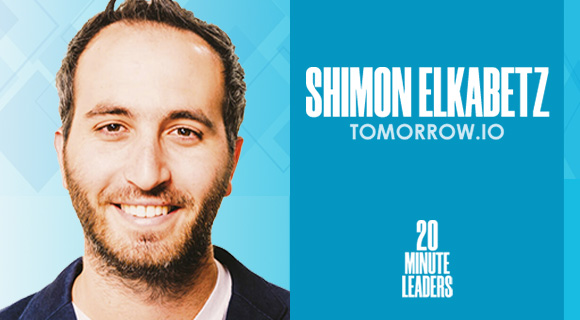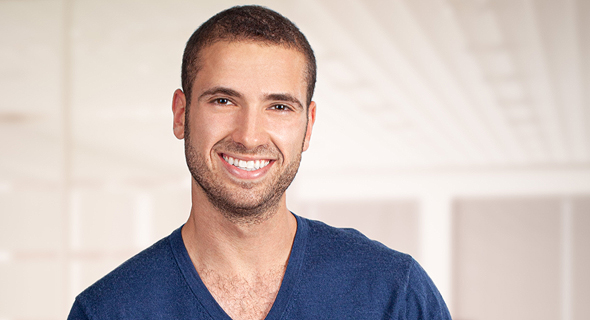“The majority of businesses and every country is going to have to deal with the impact of climate change"
Shimon Elkabetz, CEO of Tomorrow.io, shares with Michael Matias how climate change is causing more severe weather events and how his company can help
Weather impacts so many aspects of our lives and businesses, Shimon Elkabetz shares, but government agencies that are often slow to change have traditionally been the ones generating forecasts. These agencies also have different priorities than businesses, so their models focus on different things. Tomorrow.io is stepping into this innovation and insight gap to provide customers with hyper-local forecasts and models based on their needs as well as software to generate actionable insights, not just the raw weather data available in the past. Elkabetz, who is the company’s CEO, explains that climate change is already causing more frequent and severe weather events, and organizations in many domains need systems in place to help deal with those consequences. He is inspired by the impact the company is making in a variety of industries and also by the growth he sees in the employees who are committed to the mission.
Click Here For More 20MinuteLeaders
Tell me about your journey leading up to Tomorrow.io.
I grew up in Israel in the moshav, in the HaGalil, in a family of farmers. I went to the Israeli Air Force and spent about 11 years mostly as a commander, a strategic planner. It was very clear to me that the tech industry and startups is what I'm excited about. I went to Harvard Business School right after the military and reunited with good friends Rei Goffer and Itai Zlotnik in Boston. We all shared personal experience about how weather was challenging us daily during our military service and understood how it really impacts every aspect of the operations. We learned that there is a significant technology, impact, and business opportunity.
Why is it so important for us to understand weather on a scale?
First, we need to understand that climate change is here. The majority of businesses and every country is going to have to deal with the impact of climate change. We're not trying to prevent climate change from happening; it's a different scope of problem. But we're already in the era of consequences.
From restaurants in Boston that cannot serve customers outdoors if it's rainy, to insurance companies that have much bigger payouts, to on demand companies that see spikes because of the weather, to autonomous vehicles and drones that need to reroute based on local weather conditions: it's impacting almost everything. Then you need to understand that you have to put systems in place because without them, you cannot manage that challenge proactively.
The systems in place, we call it "weather intelligence." It's a more accurate and hyper-local weather forecast, but also software, automation, and insights to help you make the decision. It's really endless in terms of the customers we're targeting.

We've been getting weather forecasts for dozens of years. What's wrong with what's been happening?
To generate a weather forecast, you need to observe weather with weather stations, radars, and such. Then you need the model into which you assimilate the observations. Then you need powerful computing to basically process the model. The output of the model is a weather forecast. All of that value chain is done traditionally by governmental agencies. How many technology domains do you know that are still led end-to-end by governmental agencies? A lot was done. But like in every domain we're seeing, the private sector will have to take it to the next level. Thankfully, today, you can run models on the cloud, you can create your own models, and you can create sensors. We're doing basically all of it.
I wouldn't say it wasn’t good. It has come a long way. But the problem is that even Israel doesn't have reliable radar. The forecast we're using in Israel is actually the European global model, not one local to Israel.
Did you know at HBS that you're going to end up tackling weather forecasting issues?
I was very familiar with the problem. I had no idea how to solve that problem. But when we met in Boston and we shared stories about it and started doing the research, I was amazed that the government still creates the technology. There are big brands, but they just repackage the outputs of the governmental forecast.
Something has to be done so we can have more accurate weather forecasts in the world. We can bridge that gap of lack of coverage in many, many countries. And we can create a software solution to manage those challenges.
What are some questions that your customers are asking that they weren't able to ask before?
Until today, our customers had no solution, just use apps or watch the Weather Channel and ask, "What would be the weather?"
Today, our customers get business insights. The NFL gets a calendar view that tells them, "In this stadium and that game, that's what you need to do. The game will be pushed. You should cancel this game. The fans will experience the following." A city will get, "Flood events are going to happen in this place. You should open the sewage." We're translating raw data to insights via software. You don't need even a man in the loop if you want to go that far.
What was the reception like right from the beginning of the company?
First, let's think about the investors. There's no way we could start this company in an ecosystem that is not the US. I think there's more appetite to solving big, real-life problems in the US.
With customers, some of them were skeptical. Our first customer, JetBlue, said, "Let's do a pilot. But we don't believe you can actually help us. But start in Boston Logan." Today we're serving all of the JetBlue airports in the world. We're doing the same thing with Delta.
At the beginning, people were skeptical. "Can you really push the envelope on weather?" But when you teach people to understand that if they put systems in place and they trust a partner like us to give them data they can rely on and insight they can act on, then even if you don't change accuracy by a lot, you create a significant business ROI.
What is the leap or the differentiator that you've brought with you to Tomorrow.io?
I'm not saying, "We did something nobody else can." It's a matter of choosing a strategy and going after it. The strategy we took was to build a vertically integrated business model composed of three or four elements. One is sensing: observing the weather in a way that wasn't done until today. We're launching our own satellites. We're going to cover the world with active radars to sense weather.
The second thing is modeling. The government is not supposed to solve business problems. NOAA is incentivized to solve taxpayer problems and save people's lives. The fact that we run our own models on the cloud enables us to fine tune the resolution and choose parameters to focus on.
The third and fourth elements are the software. We built Microsoft Excel for weather. You can build your own dashboard that will tell you what to do instead of looking at the weather data. It will provide you with business insights. When you look at this end-to-end approach, this is very powerful.
What really sparked your curiosity growing up?
I was very passionate about starting my own business since I can remember myself. I also had a big passion for graphic design. I'm a terrible graphic designer, but I was using Photoshop when I was 11. It's very uncommon for someone who grew up in a village.
What really is your source of inspiration as you continue to lead this company?
One is the employees. I really want every employee that joins our company and is part of the mission to have a good experience and a good outcome, really progressing their career.
The second thing is the customers and impact. What we're doing about improving climate security for the world, helping countries have better weather forecasting, helping federal agencies like the US Air Force make better decisions, helping Delta fly safer: this is important. That is very much motivating.
The last thing is the investors. They believed in the mission. I want it to be a good outcome for them as well.
What are three words you would use to describe yourself?
Execution. I'm very detailed around that. Mission. That's really what's driving me. Sports. If you want to become my friend, just talk to me about soccer. Unless you're on the wrong side.

Michael Matias, Forbes 30 Under 30, is the author of Age is Only an Int: Lessons I Learned as a Young Entrepreneur. He studies Artificial Intelligence at Stanford University, while working as a software engineer at Hippo Insurance and as a Senior Associate at J-Ventures. Matias previously served as an officer in the 8200 unit. 20MinuteLeaders is a tech entrepreneurship interview series featuring one-on-one interviews with fascinating founders, innovators and thought leaders sharing their journeys and experiences.
Contributing editors: Michael Matias, Megan Ryan



